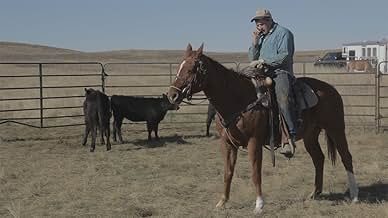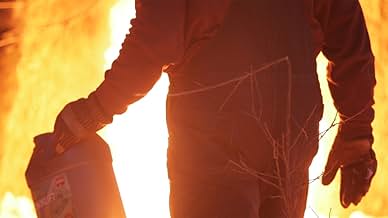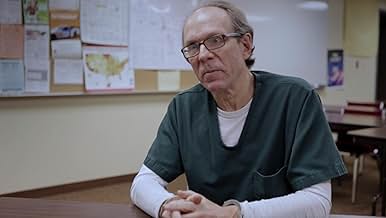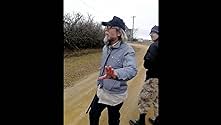IMDb रेटिंग
6.9/10
4.6 हज़ार
आपकी रेटिंग
अपनी भाषा में प्लॉट जोड़ेंWhen a noted white supremacist moves into their town, the residents of Leith, North Dakota do what they can to prevent him from taking control of the municipality.When a noted white supremacist moves into their town, the residents of Leith, North Dakota do what they can to prevent him from taking control of the municipality.When a noted white supremacist moves into their town, the residents of Leith, North Dakota do what they can to prevent him from taking control of the municipality.
- निर्देशक
- लेखक
- स्टार
- पुरस्कार
- 8 जीत और कुल 31 नामांकन
फ़ीचर्ड समीक्षाएं
The people that made "Welcome to Leith" did a nice job of presenting a reasonably well balanced and interesting story. While they obviously didn't like the white supremacists featured in the film, they also were sure to present the complete story...warts and all.
The town of Leith is extremely tiny and located in the Dakotas. When a crazed white supremacist arrives there and starts buying up property, folks start getting concerned. When he then starts inviting in other like-minded jerks, the town starts to react...strongly. What follows is a film that consists of showing the tiny town's efforts to get rid of the supremacists and prevent them from taking over Leith. Unfortunately, when the neo-Nazis actually do something that might be illegal, some of the townsfolks manage to undo the state's case by talking out of turn...and some of these people later blame the state for the case falling apart. However, the way I saw the film I don't believe the authorities LEGALLY had much more they could do about the supremacists...and the film leaves everything in limbo. This could REALLY benefit from a follow-up to know what subsequently occurred.
As I mentioned, the people who made the film were great--they were very thorough and did a wonderful job in presenting both sides. It's not 100% satisfying to watch, however, for two reasons. First, in real life things often DON'T work out perfectly...as the film illustrates. And, Second, despite 99.9% of the viewers wanting to see these neo-Nazis die or go to prison forever, legally this wasn't possible due to Constitutionally guaranteed rights...even the right to be an evil, nasty, hateful individual! To me this isn't a bad thing...everyone deserves protection--whether or not they are nice people...though I am sure many will be angered by this. Despite its shortcomings, it does make for an interesting documentary as well as a great civics lesson.
The town of Leith is extremely tiny and located in the Dakotas. When a crazed white supremacist arrives there and starts buying up property, folks start getting concerned. When he then starts inviting in other like-minded jerks, the town starts to react...strongly. What follows is a film that consists of showing the tiny town's efforts to get rid of the supremacists and prevent them from taking over Leith. Unfortunately, when the neo-Nazis actually do something that might be illegal, some of the townsfolks manage to undo the state's case by talking out of turn...and some of these people later blame the state for the case falling apart. However, the way I saw the film I don't believe the authorities LEGALLY had much more they could do about the supremacists...and the film leaves everything in limbo. This could REALLY benefit from a follow-up to know what subsequently occurred.
As I mentioned, the people who made the film were great--they were very thorough and did a wonderful job in presenting both sides. It's not 100% satisfying to watch, however, for two reasons. First, in real life things often DON'T work out perfectly...as the film illustrates. And, Second, despite 99.9% of the viewers wanting to see these neo-Nazis die or go to prison forever, legally this wasn't possible due to Constitutionally guaranteed rights...even the right to be an evil, nasty, hateful individual! To me this isn't a bad thing...everyone deserves protection--whether or not they are nice people...though I am sure many will be angered by this. Despite its shortcomings, it does make for an interesting documentary as well as a great civics lesson.
I wish that this wasn't a documentary.
The movie overall is extremely gripping and entertaining and well-put together. The content is horrible, and I wish that the events shown in it had never happened. This has little to do with my enjoyment of the film, however. The movie was well-put together and I liked seeing all the perspectives. It seemed like the filmmakers were trying to get the audience to sympathize with the nazis, but other than that I enjoyed this movie.
The movie overall is extremely gripping and entertaining and well-put together. The content is horrible, and I wish that the events shown in it had never happened. This has little to do with my enjoyment of the film, however. The movie was well-put together and I liked seeing all the perspectives. It seemed like the filmmakers were trying to get the audience to sympathize with the nazis, but other than that I enjoyed this movie.
This documentary speaks volumes and is very relevant to America in 2016-2018 with what is happening in the news.
This should be shown in every school to help fight hatred and learn how to stand up to them. Kudos to the producers for making such an important piece and getting it out there
This should be shown in every school to help fight hatred and learn how to stand up to them. Kudos to the producers for making such an important piece and getting it out there
This film definitely gets the conflict: a dying town receives new arrivals who they do not want. We see a lot of bad behavior, without seeing how it came about. We hear a lot about how people feel -- but not how they got there. We see a lot of things, but we don't see the causes; we can only accept what the film shows us.
In this way, "Welcome to Leith" is very much a shaped film about real people in a real event. Sympathy clearly exists for the townspeople, but we are also given good exposure to the newcomers, who present their views openly. Unexplored is how the behavior of the good townspeople is often worse than that of the prejudiced newcomers -- or is it? We don't know, but in this film we see property destruction only by one side, and it's not the newcomers.
Making issues more complicated, the arguments given by the old-timers only tangle things further; we can imagine the same arguments happening in dying white towns receiving new non-white occupants. Sure, the answer feels obvious to all of us -- but you can't argue a feeling into a legal action ... or can you?
Perhaps the filmmakers realized all this; the title alone is ironic, since clearly the town of Leith is *not* welcoming these people. But in a free democracy, property up for sale can be bought by anyone interested. What we haven't figured out how to manage, is how to balance the rights of the existing inhabitants with those of the newcomers. "Welcome to Leith" shows this problem is still very much alive -- regardless of which side of the Sold sign you're standing on
In this way, "Welcome to Leith" is very much a shaped film about real people in a real event. Sympathy clearly exists for the townspeople, but we are also given good exposure to the newcomers, who present their views openly. Unexplored is how the behavior of the good townspeople is often worse than that of the prejudiced newcomers -- or is it? We don't know, but in this film we see property destruction only by one side, and it's not the newcomers.
Making issues more complicated, the arguments given by the old-timers only tangle things further; we can imagine the same arguments happening in dying white towns receiving new non-white occupants. Sure, the answer feels obvious to all of us -- but you can't argue a feeling into a legal action ... or can you?
Perhaps the filmmakers realized all this; the title alone is ironic, since clearly the town of Leith is *not* welcoming these people. But in a free democracy, property up for sale can be bought by anyone interested. What we haven't figured out how to manage, is how to balance the rights of the existing inhabitants with those of the newcomers. "Welcome to Leith" shows this problem is still very much alive -- regardless of which side of the Sold sign you're standing on
Leith, a registered ghost town in North Dakota, is home to twenty people and a single shop. The almost entirely forgotten town suddenly becomes the most discussed settlement in America as renowned white supremacist Craig Cobb moves in to buy up land and property to rent out or give away to the country's most notorious Nazi groups. Cobb's grand plan is to become mayor of the town and create America's first legal white-only town. This startling documentary details the events of the subsequent months.
With its isolated small town backdrop and bleached, low-contrast colourisation of the stock, Welcome to Leith gives the impression of a fictional horror movie. During the winter months, you could be watching Fargo. As the feeling of threat and dread hover over the dinner table during the resident's mealtimes, it appears to come straight from a M Night Shyamalan nightmare.
Cobb's appearance is part aging thrash metal guitarist, part Peter Stringfellow with jovial smiles that betray the viciousness below the surface. Dutton is an Iraq war veteran with possibly the worst Hitler moustache in history who seems to gain more sympathy from the audience than loathing. It feels that Dutton, although harbouring abhorrent beliefs, is principally concentrating on receiving approval from Cobb, who takes on an adopted father figure role. It's Dutton's girlfriend Deborah Henderson who is the truly chilling one, with a vicious uncompromising hatred for non-whites and a predatory growl constantly smeared across her face.
What Nichols and Walker do exceptionally shrewdly is to give both corners of the ring the time to discuss their particular point of view. What this effectively does is give access to all of the players, something rarely achieved in a documentary about extremism, and this produces a wonderful insight into evil-doer's everyday life. Seconds after seeing Dutton performing aggressive sieg heils at a town meeting in the face of Leith's only black resident, Bobby Harper, we see him making banana fritters in his kitchen discussing his dreams of becoming a celebrity chef. The writers realise that given enough rope, the white supremacists will happily hang themselves anyway; the exasperated cries from the Cheyenne plains are clearly audible as Dutton argues that white births are now in the minority for the first time in American history. Cobb takes a DNA test on national television to prove his racial purity, only to find out he's fourteen percent African.
This even handedness rightfully reaps rewards towards the end of the film as they manage to obtain video footage from Deborah Henderson's smartphone. This shows Cobb and Dutton marching through the town with loaded rifles shouting racial slurs at the residents. It is at this moment, with whispered comments such as 'Make sure they shoot first', the realisation sinks in that for all the talk and arrogant discrimination, there is a true threat of lethal violence involved here.
Another attractive observation is the charming naivety the original residents have to extremism. Mayor Schock freely admits to not even knowing what a white supremacist was before meeting Cobb. It is refreshing then to observe how a community can pull together to defend one another's rights, and you get a stimulating insight into the way America works at ground level as the council try to work around the first amendment excuses Cobb obsesses on so well. When does one's right to freedom of speech become another's illegal hate- crime discrimination? The town's council at one point pass a new law requiring every living accommodation to have plumbed sewage, in one clean sweep making the majority of Cobb's rental properties, housing the white supremacists, illegal. This is a fascinating move to counteract Cobb's completely, and astonishingly, legal Nazi hate- speech and threats of gun violence.
Welcome to Leith is a terrifying yet fascinating account of a dark recess of American society and culture. It is made with clarity and observed impartiality and stands out impressively against previous documentaries of a similar ilk.
With its isolated small town backdrop and bleached, low-contrast colourisation of the stock, Welcome to Leith gives the impression of a fictional horror movie. During the winter months, you could be watching Fargo. As the feeling of threat and dread hover over the dinner table during the resident's mealtimes, it appears to come straight from a M Night Shyamalan nightmare.
Cobb's appearance is part aging thrash metal guitarist, part Peter Stringfellow with jovial smiles that betray the viciousness below the surface. Dutton is an Iraq war veteran with possibly the worst Hitler moustache in history who seems to gain more sympathy from the audience than loathing. It feels that Dutton, although harbouring abhorrent beliefs, is principally concentrating on receiving approval from Cobb, who takes on an adopted father figure role. It's Dutton's girlfriend Deborah Henderson who is the truly chilling one, with a vicious uncompromising hatred for non-whites and a predatory growl constantly smeared across her face.
What Nichols and Walker do exceptionally shrewdly is to give both corners of the ring the time to discuss their particular point of view. What this effectively does is give access to all of the players, something rarely achieved in a documentary about extremism, and this produces a wonderful insight into evil-doer's everyday life. Seconds after seeing Dutton performing aggressive sieg heils at a town meeting in the face of Leith's only black resident, Bobby Harper, we see him making banana fritters in his kitchen discussing his dreams of becoming a celebrity chef. The writers realise that given enough rope, the white supremacists will happily hang themselves anyway; the exasperated cries from the Cheyenne plains are clearly audible as Dutton argues that white births are now in the minority for the first time in American history. Cobb takes a DNA test on national television to prove his racial purity, only to find out he's fourteen percent African.
This even handedness rightfully reaps rewards towards the end of the film as they manage to obtain video footage from Deborah Henderson's smartphone. This shows Cobb and Dutton marching through the town with loaded rifles shouting racial slurs at the residents. It is at this moment, with whispered comments such as 'Make sure they shoot first', the realisation sinks in that for all the talk and arrogant discrimination, there is a true threat of lethal violence involved here.
Another attractive observation is the charming naivety the original residents have to extremism. Mayor Schock freely admits to not even knowing what a white supremacist was before meeting Cobb. It is refreshing then to observe how a community can pull together to defend one another's rights, and you get a stimulating insight into the way America works at ground level as the council try to work around the first amendment excuses Cobb obsesses on so well. When does one's right to freedom of speech become another's illegal hate- crime discrimination? The town's council at one point pass a new law requiring every living accommodation to have plumbed sewage, in one clean sweep making the majority of Cobb's rental properties, housing the white supremacists, illegal. This is a fascinating move to counteract Cobb's completely, and astonishingly, legal Nazi hate- speech and threats of gun violence.
Welcome to Leith is a terrifying yet fascinating account of a dark recess of American society and culture. It is made with clarity and observed impartiality and stands out impressively against previous documentaries of a similar ilk.
क्या आपको पता है
- कनेक्शनEdited into Op-Docs: Separatist (2015)
टॉप पसंद
रेटिंग देने के लिए साइन-इन करें और वैयक्तिकृत सुझावों के लिए वॉचलिस्ट करें
- How long is Welcome to Leith?Alexa द्वारा संचालित
विवरण
- रिलीज़ की तारीख़
- कंट्री ऑफ़ ओरिजिन
- आधिकारिक साइट
- भाषा
- इस रूप में भी जाना जाता है
- Witajcie w Leith
- फ़िल्माने की जगहें
- उत्पादन कंपनियां
- IMDbPro पर और कंपनी क्रेडिट देखें
बॉक्स ऑफ़िस
- US और कनाडा में सकल
- $36,010
- US और कनाडा में पहले सप्ताह में कुल कमाई
- $3,707
- 13 सित॰ 2015
- दुनिया भर में सकल
- $36,380
- चलने की अवधि
- 1 घं 25 मि(85 min)
- रंग
इस पेज में योगदान दें
किसी बदलाव का सुझाव दें या अनुपलब्ध कॉन्टेंट जोड़ें


























